Foreign Visitors Should Pay More Than Local Visitors for Cultural and Historical Attractions – IELTS Writing Task 2
Struggling with IELTS Writing Task 2? Get Band 7-9 sample answers for the topic "Foreign Visitors Should Pay More Than Local Visitors for Cultural and Historical Attractions" and learn how to craft a winning essay!
Table of Contents

Try AI Essay Checker for Instant Band Score
Agree Disagree essays, like “Foreign Visitors Should Pay More Than Local Visitors for Cultural and Historical Attractions”, are the most common type of questions in IELTS Writing Task 2.
In contrast to classic Agree Disagree essays, “To what extent do you agree or disagree” questions do not specifically ask you to declare your level of agreement or disagreement with the statement. You can either say for or against the notion or you can partly agree or disagree with it. Once you’ve made up your mind, come up with two or three arguments in favour of it.
The “Foreign Visitors Should Pay More Than Local Visitors for Cultural and Historical Attractions” is an Agree/Disagree Writing Task 2 question will help you acquaint yourself with the format of structuring an IELTS Agree Disagree essays. If you want to practise regularly, check out the Writing Task 2 practice tests.
Let’s have a look at the Agree Disagree essay – Foreign Visitors Should Pay More Than Local Visitors for Cultural and Historical Attractions – with three sample answers.
Question
You should spend about 40 minutes on this task.
Foreign visitors should pay more than local visitors for cultural and historical attractions. To what extent do you agree or disagree with this opinion?
Give reasons for your answer and include any relevant example from your own experience or knowledge.
You should write at least 250 words.
Outline
Type of Essay:Agree Disagree Essay (To what extent do you agree or disagree) Structure Breakdown:
|
Band 7 Sample Answer
Cultural and historical attractions promote tourism and preserve a nation’s heritage. It has been noticed that, in some places, foreign tourists have to pay more than the locals to buy entry tickets to popular tourist attractions. While opinions vary from this being an unfair practice to being an income-generating step, I believe it can have advantages and disadvantages, which will be outlined in the following paragraphs.
There are various reasons for charging outside visitors more than the country’s citizens. Most importantly, this price gap has a major economic impact on the local economy. When these visitors pay the extra amount, the government not only uses this money to maintain the historical sites but also adds to the country’s national income. For example, India earns more than a thousand crores from foreign exchange every year, which helps in its development. Moreover, it will develop a sense of respect among the visitors, reducing destruction and littering, which we usually see in places around the Taj Mahal and India Gate.
However, ticket price differences can have a terrible effect on the tourism industry. Many nations rely heavily on the income generated by foreign visitors, who also support local economies by staying, eating, and purchasing locally. If these tourists believe they are being mistreated and are not welcome because of the higher entrance prices, they might prefer to visit other places, reducing tourism-related income. Furthermore, the local economy, way of life, and employment opportunities may all be negatively impacted by this deterioration, which recently happened in Sri Lanka.
In conclusion, by paying more for entry to cultural and historical places of interest, foreign tourists aid the host country to earn more revenue, which is used to maintain these sites and boost positive tourism worldwide. (290 words)
Vocabulary
- Preserve (Verb)
Meaning: to keep (something) in its original state or in good condition
E.g.: The locals preserve the holy tree and worship it.
- Heritage (Noun)
Meaning: something handed down from one’s ancestors or the past
E.g.: We are proud of the cultural heritage of our country.
- Unfair (Adjective)
Meaning: not treating people in an equal way, or not morally right
E.g.: It was an unfair decision as the footballer was thrown out of the game.
- Outlined (Verb)
Meaning: to give the main facts about something
E.g.: She outlined all the essential details of this year’s target in the meeting.
- Impact (Noun)
Meaning: to have a strong effect or influence on a situation or person
E.g.: Mother Teresa’s words have a huge impact on the people.
- Foreign Exchange (Noun)
Meaning: the conversion of one currency into another at a specific rate
E.g.: The country earns a lot of money from foreign exchange.
- Deterioration (Noun)
Meaning: the fact or process of becoming worse
E.g.: The community saw the deterioration of the family from the richest to beggars.
- Host (Noun)
Meaning: to provide or arrange the venue for or receive guests
E.g.: Being a host, he had to bow down to all his guests.
- Revenue (Noun)
Meaning: the income generated from normal business operations
E.g.: The revenue generated from the sales was not enough for the company.
- Boost (Verb)
Meaning: to increase or improve something
E.g.: The growth of small businesses will boost the economy and flow of money.
Don’t wait to solve your IELTS queries? Book a free trial & talk to our Experts NOW!
Band 8 Sample Answer
Unlock Band 8 Sample Answer
In recent years, there has been a growing debate about whether foreign visitors should pay higher fees than local tourists when visiting cultural and historical attractions. While a section of people argue that it is unnecessary and promotes discrimination, I firmly disagree with this viewpoint. In my opinion, this policy can be justified on economic, infrastructural, and local community support grounds.
First and foremost, implementing a pricing scheme that charges foreign visitors more can have significant economic benefits for the host country. Tourism is one of the crucial sectors that makes a crucial contribution to the economy. For this reason, governments can increase their revenue and spend it on cultural and historical site preservation by imposing greater fees on foreign visitors. To improve visitors’ overall experience, this money might be utilized for infrastructure development, maintenance, and repair. One such example is the Konark Sun Temple in Odisha, which is under restoration so native and international visitors can be impressed by the original craftsmanship. In this sense, raising the price for international visitors enhances their experience while ensuring these attractions’ survival.
From a moral standpoint, it could appear unjust to charge foreign visitors extra to enjoy the beauty of the cultural and historical monuments. However, it’s essential to understand that this strategy can lead to a more balanced system and support the locals. Citizens who already pay taxes to maintain these heritage sites can have more access at a reduced cost by charging non-native visitors more, maintaining a sense of community and identity. Moreover, higher fees for foreign tourists can be used to fund community development projects, infrastructure improvements, and local cultural preservation efforts, like beautifying the ghats of Benaras, cleaning the Ganges River, and improving transportation in the city.
To sum up, charging visiting tourists more than natives for cultural and historical attractions is a policy that can be justified on various grounds. It not only provides a much-needed source of revenue for the preservation of these locations, but also supports the local community and ensures that the benefits of tourism are more equally distributed. (345 words)
Vocabulary
- Debate (Noun)
Meaning: a discussion between people in which they express different opinions about something
E.g.: She won the inter-school debate competition.
- Discrimination (Noun)
Meaning: the treatment of a person or particular group of people differently
E.g.: The discrimination against the labor was not tolerated.
- Infrastructural (Adjective)
Meaning: connected with infrastructure (basic, necessary systems and services such as transport)
E.g.: The new leader focused on the infrastructural and healthcare developments.
- Crucial (Adjective)
Meaning: extremely important or necessary
E.g.: The Board took a crucial decision while choosing the next CEO of the company.
- Imposing (Verb)
Meaning: to establish or apply by authority
E.g.: My mother is imposing a strict deadline due to the upcoming exams.
- Craftsmanship (Noun)
Meaning: skill in making things, especially by hand
E.g.: The global audience was impressed by the local craftsmanship displayed in the exhibition.
- Standpoint (Noun)
Meaning: a set of beliefs and ideas from which opinions and decisions are formed
E.g.: She had a clear standpoint and presented it to the faculty.
- Monuments (Noun)
Meaning: any building, surviving from a past age, and regarded as of historical importance
E.g.: The monuments should be taken care of as they tell a lot about our history.
- Non-native (Adjective)
Meaning: a person who is not a native of a particular place or country
E.g.: Don’t treat the non-native with disrespect.
- Justified (Verb)
Meaning: showing to be true, just, or valid by appeal to a standard or to precedent
E.g.: It is not justified to throw him out of the country.
Join us in our IELTS webinars to learn proven tricks to handle IELTS Writing! Explore Now!
Band 9 Sample Answer
Unlock Band 9 Sample Answer
The question of whether foreign visitors should pay higher fees than local tourists for cultural and historical attractions has sparked considerable debate. While some argue that this policy is justified for economic reasons, I will argue that making international tourists pay more is unethical. From my perspective, equal access to these sites is essential for promoting cultural exchange, fostering global understanding, and upholding the principles of fairness and equality.
Creating opportunities for cross-cultural communication and understanding is one of the main goals of historical and cultural attractions. Nonetheless, this goal is contradicted by charging foreign visitors more than locals, as done in the Taj Mahal, where locals have to pay fifty rupees. In contrast, a foreigner must spend around twenty times that amount to access the prestigious landmark. This sends a message that certain visitors are more valued than others solely because of their nationality. Such practices can lead to resentment and division among tourists, undermining the essence of cultural exchange.
Additionally, higher entrance costs make these tourists feel unfairly treated and unwanted. Thus, they might prefer to travel to other places, which would reduce tourism-related income. Consequently, the local economy, way of life, and employment prospects may all be negatively impacted by this depreciation, leading to a loss of revenue from foreign exchange, as seen in the case of Turkey, where the number of international tourists decreased due to high entry fees.
Overall, imposing additional entry charges on overseas tourists to access historical and cultural sites opposes the core values of equality, justice, and global interchange. Therefore, it is best to embrace diversity and foster an inclusive environment that not only enriches tourists’ experiences but also contributes to the economic and social well-being of the host communities. (288 words)
Vocabulary
- Unethical (Adjective)
Meaning: not morally acceptable
E.g.: It is unethical to experiment on animals.
- Fostering (Verb)
Meaning: to encourage the development or growth of ideas or feelings
E.g.: The positive outlook of the new manager is fostering creativity and hard work among the employees.
- Upholding (Verb)
Meaning: extended support
E.g.: He is upholding the principles of his father.
- Cross-cultural (Adjective)
Meaning: involving two or more different cultures and their ideas and customs
E.g.: The cross-cultural exchange between the participating countries was appreciated in the conference.
- Contradicted (Verb)
Meaning: to be so different from another fact or statement that one of them must be wrong
E.g.: His actions contradicted his words and so no one believed him.
- Resentment (Noun)
Meaning: a feeling of deep and bitter anger and ill-will
E.g.: The lack of proper increment developed a sense of resentment among the workers.
- Prospects (Noun)
Meaning: expectation of a particular event, condition, or development of definite interest or concern
E.g.: If you move to the U.S., you will find various educational and career prospects.
- Depreciation (Noun)
Meaning: decrease over time due to use
E.g.: The depreciation of the grain price affected the farmers.
- Overseas (Adjective)
Meaning: from, or connected with another country or countries
E.g.: He is excited to welcome his overseas guests.
- Interchange (Noun)
Meaning: the process in which different people or groups exchange ideas or information with each other
E.g.: The interchange of ideas between the families developed a sense of bonding between them.
Waiting for an Exclusive Study Material on IELTS Writing Task 2?
Connectors from the Sample Answers You can Use to Gain Brownie Points in IELTS Writing Task 2
Check out the list of connectors used in the above-given sample answers that will help you add coherence to your writing and earn points for your IELTS Writing Task 2.
- Most importantly
- For example
- Moreover
- However
- Furthermore
- In conclusion
- In my opinion
- First and foremost
- For this reason
- To sum up
- From my perspective
- Nonetheless
- Additionally
- Consequently
- Thus
- Overall
Now that you have gone through the sample answers on the topic – Foreign Visitors Should Pay More Than Local Visitors for Cultural and Historical Attractions – it is time for you to try writing on your own. For that, leave your answers as a comment below or you can use our FREE evaluation service!
Additional Resources
Explore IELTS Writing

Start Preparing for IELTS: Get Your 10-Day Study Plan Today!
Explore other IELTS Articles
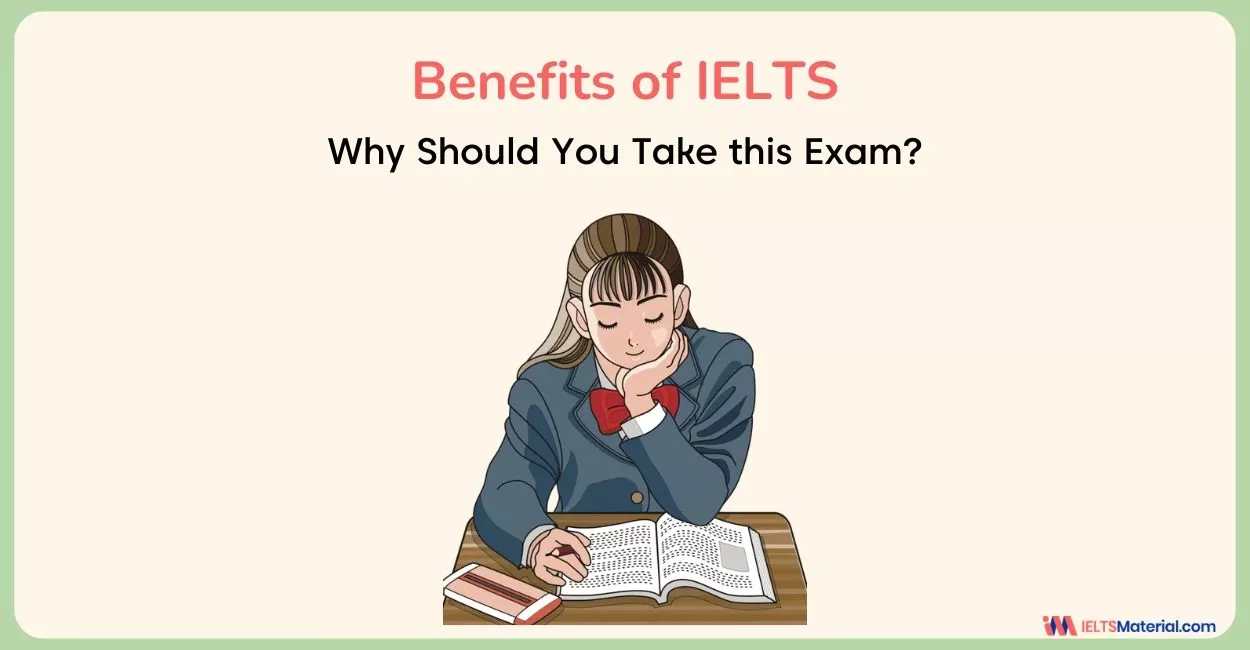
Kasturika Samanta
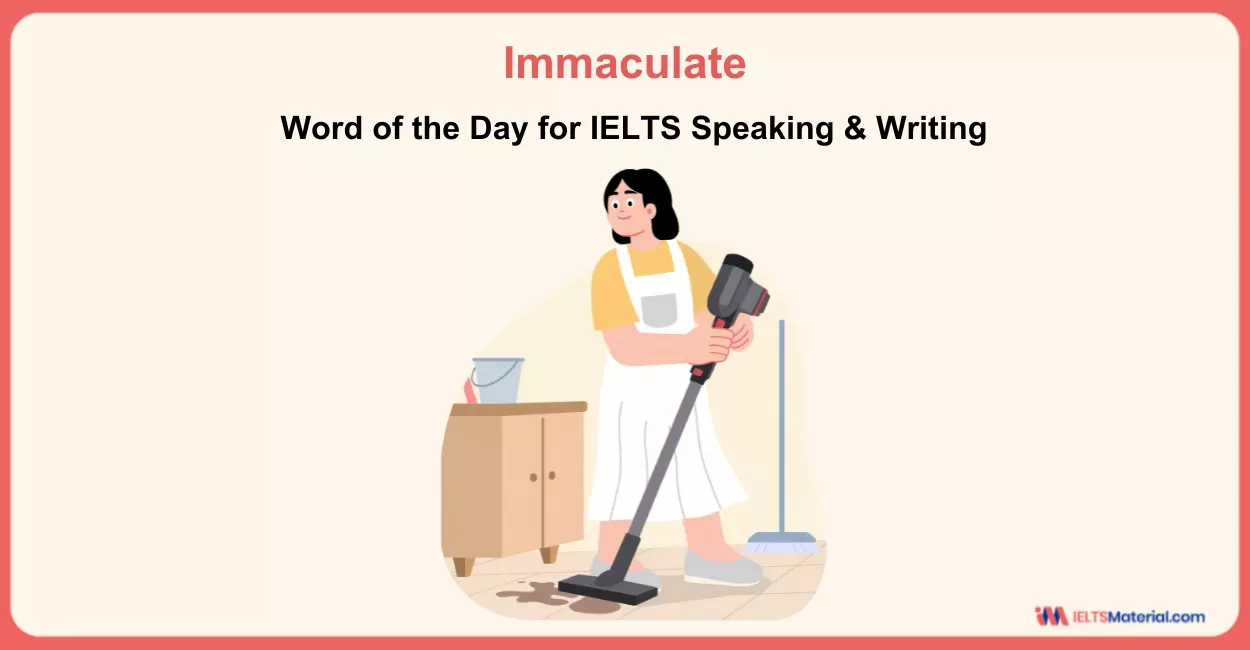
Haniya Yashfeen
Recent Articles
Haniya Yashfeen

Kasturika Samanta
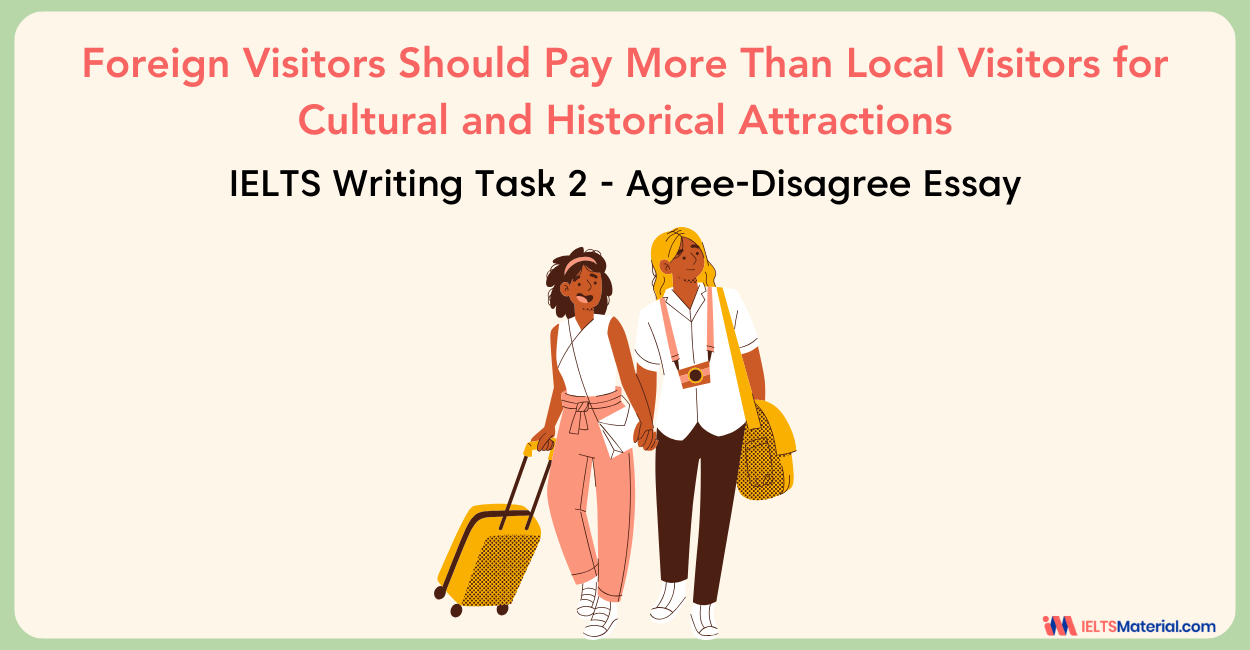

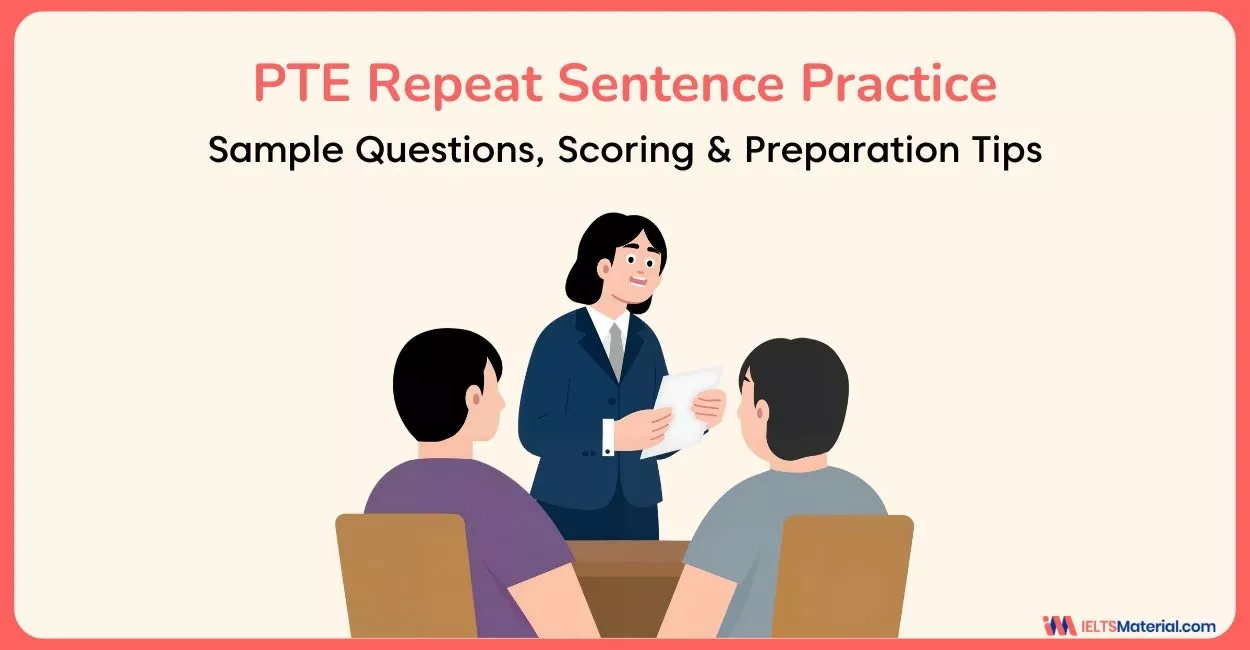
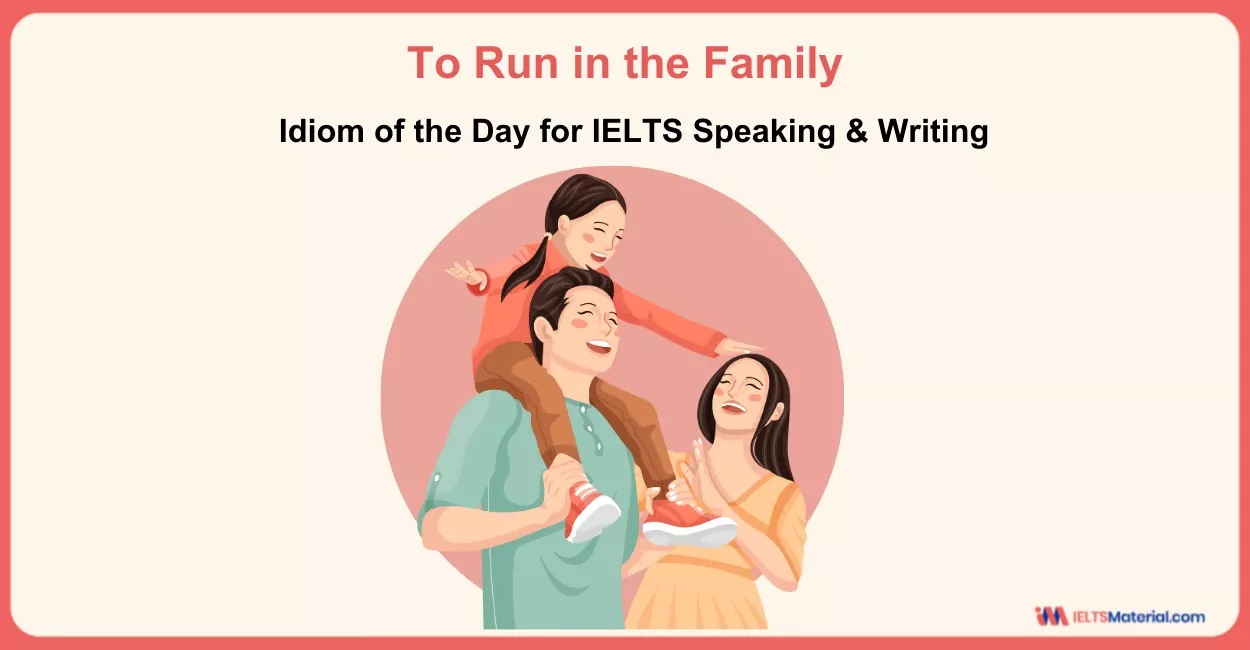




Post your Comments